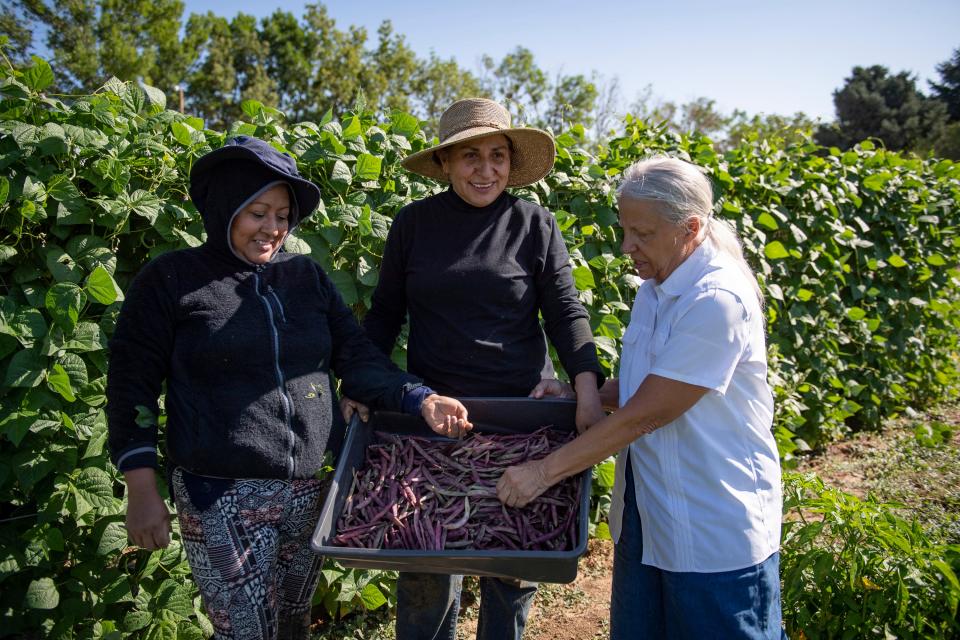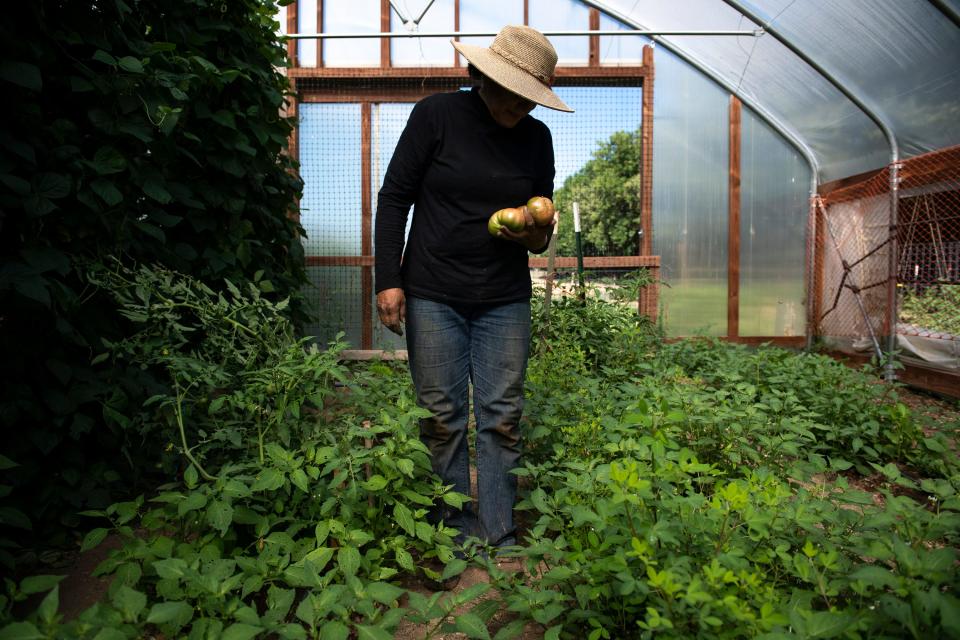Meet Proyecto, a Fort Collins-area farm project giving immigrant women skills, confidence
Just east of Larimer County Road 3 on a hill overlooking Windsor sits Buena Vida Farm, where 35 acres of blue spruce saplings poke out of the ground. Peppers, tomatoes, onions and other crops lay ripe and ready for harvest, and chile ristras hang from porch rafters on the farm’s house, a symbol of welcome.
It's only 10:30 a.m., but five women sit at an outdoor picnic table laughing and chatting in Spanish while eating lunch. They've been working since 5 or 6 a.m. to avoid the afternoon heat, so lunch comes early.
When their break is over, the women head back to their crops to pick the day's yield: onions, tomatoes, cilantro, squash, cucumbers and peppers to be sold to Boulder Farmers' Market and Morning Fresh Dairy in Bellvue, which sells veggie bundles to customers.
Some will be packaged into salsa kits for Beaver's Market in Fort Collins.
The women are part of the Hispanic Women's Farming Proyecto, a 3-year-old nonprofit started by MaryLou Smith at Buena Vida.
Smith said she has "a real love of Hispanic culture" and has long helped Spanish speakers learn English. The retired policy and collaboration specialist for the Colorado Water Institute at Colorado State University wanted Hispanic women to have a chance to grow and sell their own vegetables as well as learn about agriculture, marketing, grant writing and business.
Proyecto teaches women who are immigrants new, marketable skills while enabling the farm to use its land and water.
A half dozen Hispanic women are accepted into the program for the growing season and receive $5,000 scholarships to learn about irrigation, soil and soil health.

They plant and tend crops and harvest when the time is right. They meet one day a week from planting until harvest and keep the proceeds from their sales, which Smith estimates will near $20,000.
The farm provides the land, water and equipment while grants and donations pay for seeds, transplants and scholarships. Smith taps into a willing core of experts from CSU who teach the women about soil and plant health, irrigation, food safety and more.
The women can stay for multiple growing seasons if they choose. Juanita is the newest; she came on board this year. Nora is back for her third year. When they decide they no longer want to come back, the women receive an agriculture practitioner certificate of completion.
Rebeca, who serves as the sales executive working with Boulder Farmers’ Market and Morning Fresh Dairy, says the program has given her new confidence. "Si puede." She plans to stay at Proyecto as long as "God and MaryLou allow."
She's not sure what she wants to do after she leaves the program. "Maybe selling," she says. She also wants to teach other Hispanic women how to do what she does at the farm or work for a nonprofit encouraging women to learn new skills.
Marta is helping the Hispanic community find resources, Smith said. Proyecto "is much more important than training for agricultural work, she said. "Now the women can go and be creative thinking about what they might do."
Speaking in Spanish and translated by Smith, Rebeca says: “It’s a privilege to be part of the program." She’s nervous and reluctant to speak English during the interview, Smith says.
Three of the women took English classes at Front Range Community College in the winter; Rebeca plans to start them again in the fall.
Continuing in Spanish, Rebeca says, through a translator, “I’ve learned a lot about agriculture, health of the soil, how to prepare the soil and plant seed. This was a way to earn additional money and learn something as well. MaryLou is a good teacher.”
Smith said she’s good at teaching people how to work together as a team. “They gain confidence through mentoring.”
Marta, who also works as a nanny in Greeley, is learning to handle the books for Proyecto, writing checks and balancing the books.

“When she came here, she didn’t have much confidence,” Smith said. “Now, she’s involved in the Colorado Immigrant Rights Coalition, which sent her to Washington, D.C., to join a march in front of the Immigration and Customs Enforcement office. “She attributes that increased confidence to the project,” Smith said.
Veggie delivery to your door through Morning Fresh
Last year, Proyecto had a weekly order for 100 pounds of Cherokee purple tomatoes from Boulder Farmers Market but the crop was producing 300 pounds per week.
Smith reached out to a local blog for small farmers, asking “who could use 200 pounds of tomatoes a week?”
Morning Fresh Dairy responded and began offering the tomatoes to its delivery customers. “They also had extra salsa kits,” said Amber Graves, the dairy's continuous improvement director. “It went decently well, so we were thinking for this year we’d do whole veggie bundles.”
It’s something Morning Fresh did “years ago” through another local farm “and people really liked it.”
Today, Morning Fresh delivers between 25 and 30 veggie bundles a week to customers. Each bag contains up to five different vegetables — a variety of whatever is harvested that week.
Morning Fresh buys the vegetables from the Proyecto, then sells them to its customers. “We’re getting the word out,” Graves said. “More people are realizing they can get veggies delivered fresh to their door. That’s pretty cool.”
Graves said its a very “Front Range” thing to do. “People really value local here.”
Graves first met Rebeca last year when she visited the diary. “It’s an awesome program,” Graves said. “They’re so happy all the time and grateful to get the food out there. I wish there was more stuff like this to give people a head start. It’s not just random people with random vegetables. It’s a real cause.”
How to help Hispanic Women's Farming Proyecto
The fiscal sponsor for the Hispanic Women's Farming Proyecto is Fort Collins Community Action Network, a 501(c)(3). Donations can be sent to Hispanic Women’s Farming Proyecto in care of Fort Collins Community Action Network, P.O. Box 400, Fort Collins, CO, 80522. Checks must be made out to FCCAN, referencing the Hispanic Women’s Farming Proyecto in the memo line.

This article originally appeared on Fort Collins Coloradoan: This Colorado farm teaches immigrant women skills, self-confidence

